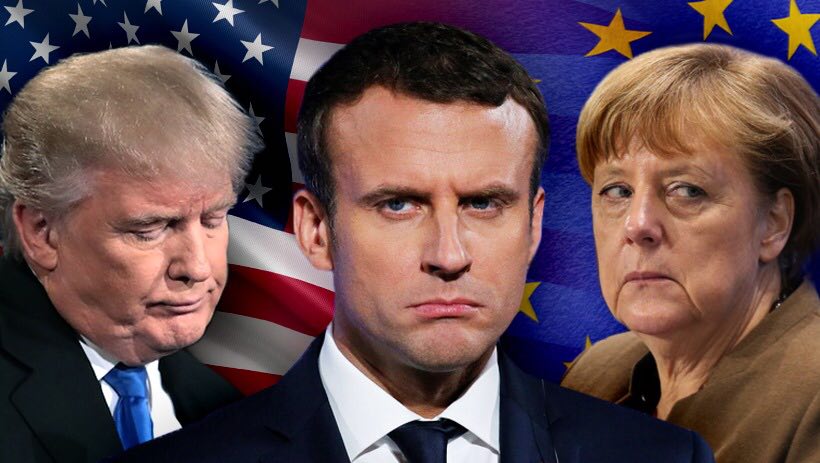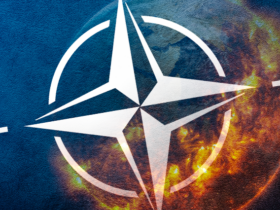When Donald Trump unilaterally withdrew the United States from the Joint Comprehensive Plan of Action (JCPOA), or the “Iran nuclear deal”, in May 2018, the balance of geopolitical forces in the world was put on the verge of revolution. Trump’s move was not merely an instance of re-negotiating the US’ strategic position on one or more fronts. In all actuality, by abandoning the Iran deal, Trump effectively put the whole Atlanticist project into question. The position in which such has left the European Union in particular, and European geopolitical apperception in general, is crucial to understanding coming processes in international relations.
The American tearing up of the JCPOA and the re-imposition of relevant sanctions signaled not only a challenge to Iran, but to Europe. In February 2018, it was reported that EU-Iran trade had reached 53% year-on-year growth, attaining 21 billion euros, with the eurozone’s imports from Iran exceeding its exports to the state, leaving a trade balance of 600 million euros in favor of Europe. The trend of increasingly profitable economic dealings between Europe and Iran was suddenly threatened in June, when Trump affirmed that sanctions would “absolutely” include European companies doing both direct and indirect business with Iran. Washington thereafter unleashed a tariff war with the EU which subsequently saw European counter-measures imposed, and a number of loud threats from both sides of the Atlantic. The world began to watch with baited breath as the two pillars of Atlanticism – the Washington and Brussels establishments – threatened to collapse on one another over Iran.
The genie was stuffed back into the bottle at the end of July, when Trump and EU Commission President Jean-Claude Juncker agreed to temporarily resolve disputes by guaranteeing EU gas and agricultural imports from the US, refraining from the 25% tariff on European cars which Trump previously threatened, and seeking further bilateral negotiations on controlling tariffs.
To be clear, this should be seen as none other than a temporary compromise, and an unsustainable one at that, for a number of reasons. First of all, the main issue of the US’ renewed offensive against Iran and the fact that related US sanctions will hit EU firms has not been removed. Secondly, the recent explosion in the US’ flipping of the sanctions switch on a whole range of countries and its blatantly obvious use of such as a pressure mechanism to advance political interests in lieu of diplomacy suggests that Washington can and will pursue economic warfare against its former vassals and “allies” whenever the time is ripe. Washington’s intense crackdown on its former NATO ally, Turkey, has been a demonstrative warning to everyone else. Thirdly, and perhaps most importantly, Trump’s program for reforming the US’ imperial geopolitics under the slogans of “Make America Great Again” and “America First” necessarily entails the collection of tribute from European countries for the US to cover the costs of its failing Atlanticist project, as well as retracting from the commitment to the “European front” to which the US has devoted perhaps the most significant portion of its resources since World War II. It is also crucial to note that the EU’s commitment to purchase US gas goes against all economic and geopolitical logic, and threatens to condemn the EU to forced energy dependence on a declining power in a distant hemisphere which has prodded Europe into conflict with precisely such rising states as Russia and Iran that are more than capable of offering energy deals more favorable and sustainable in the long term for European states and consumers. Therefore, the current simmering down in the US-EU trade war will not last. The suspense is still very real, and the stakes are very high.
The question begs itself: if the Trump-Juncker agreement was a temporary compromise, then what is the EU compromising? While the economic balance sheet of what the EU saved by avoiding trade war is worth billions of euros in key trade sectors, the Washington-Brussels agreement is a significant loss for Europe from a strategic standpoint. The US has essentially demonstrated that it is willing and able to unilaterally abandon international agreements and threaten its yesterday’s European partners with hard-hitting economic pressure if they don’t follow suit with no questions asked. The EU, in turn, has essentially conceded that it will remain loyal to its unequal relationship with the United States, even if its own companies will still face sanctions, in exchange for temporarily retained trade profits in the short-term. This is a clear sign of a lack of strategic thinking on Europe’s part.
The EU’s subservience in giving in to a temporary economic deal with Washington looks especially suspect when compared to other countries’ reactions to US sanctions. When Trump sanctioned and raised tariffs against Turkey, Ankara fought back with its own counter-measures, and Russia and Iran voiced their support. When Washington ripped up the Iran nuclear deal, the Iranian leadership made the point of encouraging Europe to stake its own independent position – or, as Iranian President Rouhani told London, “the ball is in Europe’s court now.” When the US recently announced two new packages of sanctions against Russia, President Putin summoned the Security Council, PM Medvedev denounced Washington’s “declaration of economic war”, and Russia’s foreign ministry has stared down the US’ ultimatum, pledging to wait to see if Washington follows through and to deliver reciprocal sanctions if it does. All of the above countries have since engaged in negotiations with one another to expand their economic ties and trade in national currencies independent of the US. China, meanwhile, which has been the main target of Trump’s MAGA trade war, has remained firm at the negotiating table, refusing to agree to strategically unfavorable trade offs in the likes of which Europe has accepted. Unlike Europe, these countries have increasingly demonstrated a commitment to sovereignty against economic blackmail, and they have operated with an understanding of the long-term trends of international relations towards multipolarity, away from US hegemony.
This is an extremely telling instance as to the crisis of the Atlanticist project, and the crisis of the EU elite. As many independent analysts cogently forecasted, the election of Donald Trump on a platform dedicated to drastically reforming the US Atlanticist project has meant that the Atlanticist EU elites have had the rug torn out from under them. Whatever independence individual European leaders and economies might have carved out and bargained within the framework of the Atlanticist project over the past several decades, or in relations with countries opposed to the Atlanticist project such as Russia, China, and Iran, is now being undermined by none other than the auditing Atlanticist headquarters in Washington.
In this situation, the EU elite is at a crossroads. The EU elite is faced with (1) aggressive pressure from the United States to discard any attempts at independent relations with rising players like Iran, Russia, and China, (2) growing discontent with the current form, terms, and domestic and foreign policy dogmas of the European Union among member-states, (3) and the rise of so-called “populist” forces to the point of being in a position to replace local and national establishments across both “Old Europe” (represented largely by Germany, France, and Italy) and “New Europe” (the states incorporated as part of the Atlanticist project over the past three decades in “Central and Eastern Europe”, such as Hungary and Poland). In this unavoidable context, the EU elite has to face the fact that the Atlanticist, globalist, liberal project to which it has hitherto subordinated its domestic and foreign policies is increasingly unviable and unattractive.
This means that the window of the “European moment” or “European dilemma” has arrived. Europe has to choose between rising to the challenge of emerging multipolarity and organizing itself as an independent pole in international relations, or continuing down the present path of crisis and disintegrating. The European Union will not survive the latter, and the capacity of stand-alone individual European countries to handle major 21st century domestic and foreign policy issues on their own – all the while under the threat of US sanctions and in view of the rise of new integration projects and blocs across Eurasia – is, to put it mildly, unlikely.
The collapse of the JCPOA on Washington’s initiative is therefore of the greatest significance not only in geopolitical terms, but as a symbolic warning for Europe. For now, the EU has sought to patch up straining relations with Washington through hardly justifiable trade-offs. Yet there are no guarantees whatsoever that such will be sustainable or desirable. As European actors increasingly realize that Europe needs an alternative security, economic, and integration framework to survive the collapsing Atlanticist project and the new, emerging conditions of multipolarity in the 21st century, no temporary deals with Trump will be able to compensate for Europe’s need to look inward and eastward.
The ball is in Europe’s court now, indeed.

















Leave a Reply